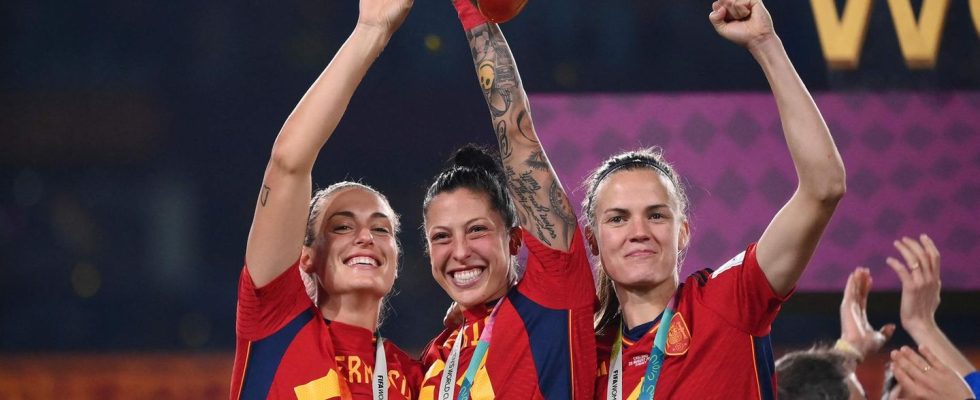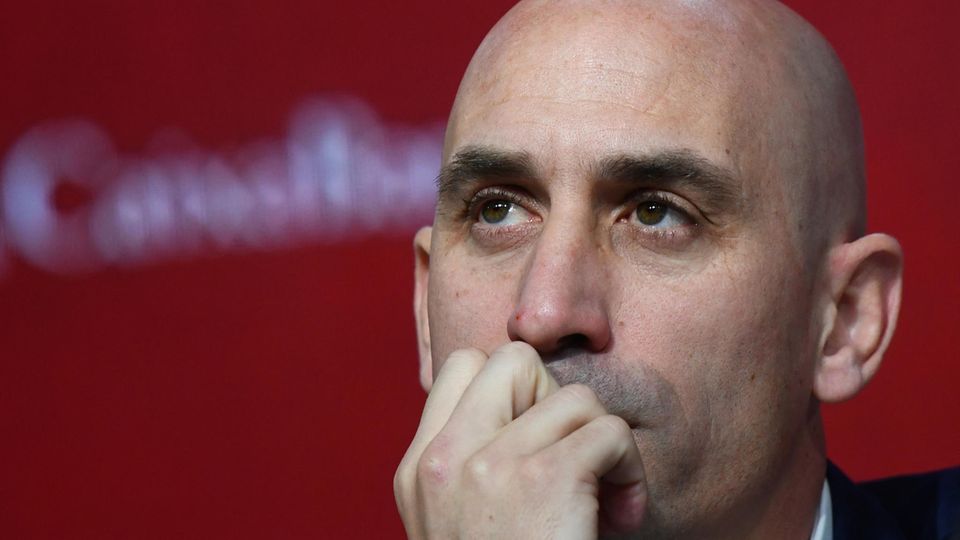After the kissing scandal
They are calling for more resignations: Spanish national team players continue to refuse to play
Alexia Putellas (l.), Jennifer Hermoso (m.), and Irene Paredes hold the World Cup trophy in the air
© Franck Fife / AFP
There is a new national coach, but that is not enough: The Spanish national players around Jennifer Hermoso are refusing to compete in the upcoming international finals in the Nations League and are violently attacking the Spanish Football Association.
The Spanish Football Association is sinking deeper into chaos after the kissing scandal involving resigned President Luis Rubiales. “Division” and “manipulation” threw the world champion Jennifer Hermoso presented the national association RFEF “to intimidate us and threaten us with legal consequences and economic sanctions,” as she wrote early Tuesday morning on the X portal (formerly Twitter). It’s ice time after the association called up the striking footballers for the upcoming international matches on Monday against their will.
Rubiales kissed Hermoso on the mouth without being asked at the award ceremony after Spain’s final triumph over England in Sydney on August 20th, triggering huge outrage around the world. He further asserts that the kiss immediately after the World Cup victory was mutually agreed upon. Hermoso contradicts this.
The government is also putting pressure on the players
“We have spent weeks, months looking for this protection that we could not find in the RFEF itself. The same people who ask us for trust are the ones who today publish a list of players who have asked “Not to be appointed,” criticized Hermoso.
However, the government is also putting pressure on the footballers: “If the players don’t compete, I’m sorry, the government has to act and enforce the law,” said Víctor Francos to the radio station El Larguero late on Monday evening.
Francos is the president of the highest Spanish sports authority CSD, he announced talks and an attempt at mediation. If this fails, there will be even greater trouble. According to Spanish sports law, refusing to compete despite being nominated is a particularly serious offense that can result in fines of between 3,000 and 30,000 euros and bans of between 2 and 15 years.
Spain wants to qualify for the Olympics
Spain wants to qualify for the 2024 Olympics in Paris via the Nations League. On Monday, new national coach Montse Tomé nominated 15 world champions for the first two games of the competition on Friday in Sweden and next Tuesday at home against Switzerland. Tomé replaced Jorge Vilda, who was fired following the World Cup following the scandal.
Tomé assured journalists in Madrid that she had spoken to the footballers she had nominated and that none of them had refused to take part in the matches. The players around world footballer Alexia Putellas saw things completely differently. Late on Monday evening they announced that they would continue their international strike.
Hermoso had not been appointed by Tomé. The trainer said the reasons were that they wanted to “protect” Hermoso. In her statement on
Players want to keep the pressure up
Shortly before midnight, Aitana Bonmatí, who was named the best World Cup player, wrote on X, among other things: “(…) our firm will not to be nominated for legitimate reasons (…) remains fully valid.” Hermoso wrote that she stood by her teammates.
Through their international match strike, the footballers want to keep the pressure on the association high. 21 members of the world champion squad and 18 other top players called, among other things, for the removal of RFEF interim boss Pedro Rocha and other officials close to Rubiales. Ironically, national coach Tomé is also considered a Rubiales confidante.
On Monday, the association issued a communiqué on the occasion of the squad nomination and emphasized: “We guarantee the players a safe environment and are committed to a climate of mutual trust in order to work together to ensure that women’s football develops even stronger in the future .”


